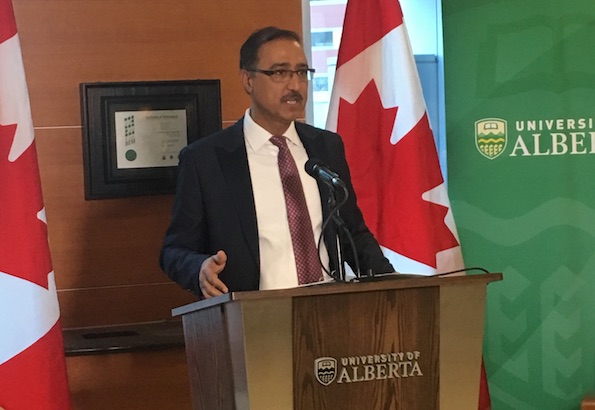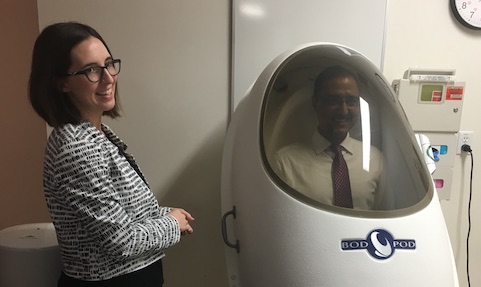
The Honourable Amarjeet Sohi, Minister of Infrastructure and Communities, announced the $50.6 million investment in Alberta
Honourable Amarjeet Sohi, Minister of Infrastructure and Communities, announced today the $50.6 million investment in Alberta through 69 research grants from the Canadian Institutes of Health Research (CIHR), of which $19.1M is awarded to the University of Alberta.
Of the 30 project grants funded at the University of Alberta, seven members of the Alberta Diabetes Institute received awards, representing a quarter of the overall funding to the university.
Project grants are designed to support researchers at any career stage to build and conduct health-related research and knowledge translation projects across CIHR's mandate.
Congratulations to the seven members of the Alberta Diabetes Institute to have received CIHR funding:
-
Richard Lehner - Role of a lipid hydrolase TGH in hepatic fat storage and lipoprotein secretion
-
Jason Dyck - Fatty Acid Handling and Cardiac Dysfunction
-
Rene Jacobs - Intestinal phosphatidylcholine synthesis, dietary lipid handling and the metabolic syndrome
-
Gavin Oudit - Role of PI3Kinase alpha in Cardiovascular Disease and Cardiotoxicity
-
Peter Light - Characterization of a novel light-sensitive signalling pathway in subcutaneous human adipocytes
-
Catherine Field - Establishing dietary treatment with DHA as part of neoadjuvant chemotherapy for breast cancer
-
Rhonda Bell - Maternal Iron Nutrition and its Consequences in Pregnant Women and Their Children in the Alberta Pregnancy Outcomes and Nutrition (APrON) Study
Peter Light, Rene Jacobs and Gavin Oudit have previously received studentship, pilot project or J&J funding respectively from the Alberta Diabetes Institute, funded by the Alberta Diabetes Foundation, for their projects at an earlier stage and this has now resulted in $2.1M in new CIHR funding from an initial investment.
After the announcement in the Li Ka Shing Centre for Health Innovation, Minister Amarjeet Shoi had the opportunity to visit our Clinical Research Unit, touring the facility and learning about the research happening in the unit and and experiencing first hand the Institute's 'infrastructure', sitting in the BodPod, a machine that measures body composition, managed by the Human Nutrition Research Unit.
